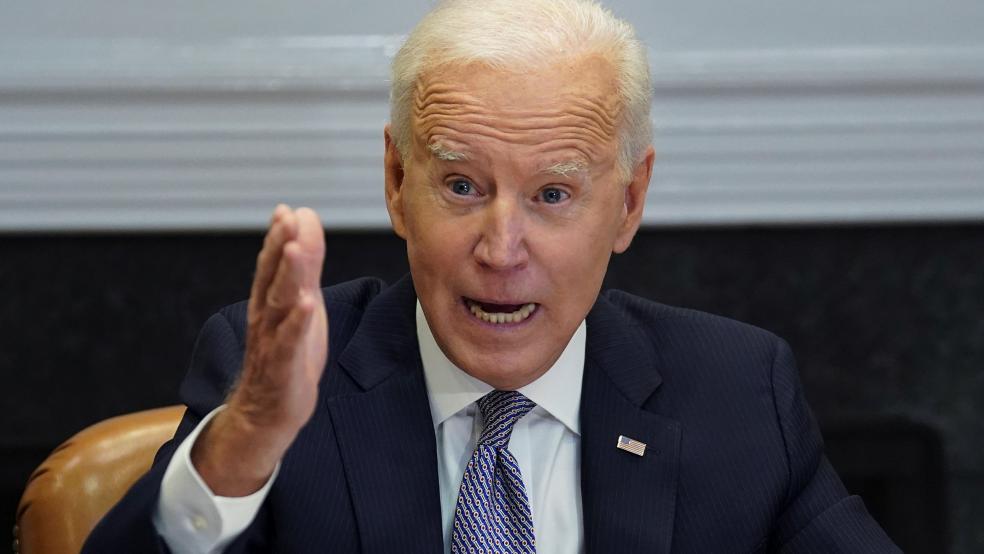President Joe Biden met Monday with a bipartisan group of lawmakers as he begins what will be a weeks-long push to win congressional support for his nearly $2.3 trillion infrastructure plan.
“I’m prepared to negotiate as to the extent of the infrastructure project as well as how we pay for it," Biden said at the start of his Oval Office meeting.
As lawmakers return to the Capitol for the first time in two weeks, Biden’s plan already faces opposition from Republicans and even some members of his own party, and negotiations over the coming month or so will be crucial to determining the size, scope and ultimate fate of the proposal.
“I think everyone acknowledges we need a significant increase in infrastructure. It's going to get down to what we call infrastructure,” Biden said, adding that he believes that access to clean water and high-speed broadband qualify. “It's not just roads, bridges, highways, etc.”
Four Republicans and four Democrats met with Biden and Vice President Kamala Harris: Sens. Maria Cantwell (D-WA), Roger Wicker (R-MS), Deb Fischer (R-NE) and Alex Padilla (D-CA) and Reps. Don Young (R-AK), Don Payne (D-NJ), Garret Graves (R-LA) and David Price (D-NC).
“The lawmakers in Monday's meeting are not the names usually associated with Oval Office meetings on major legislative initiatives -- no members of congressional leadership or high-profile moderates are on the invite list,” CNN’s Kate Sullivan and Tami Luhby note. “Instead the guest list is made up of lawmakers from both parties who have a history of working on infrastructure and sit on the committees that will shape the proposal as it moves through Congress.”
Among the lawmakers notably not in Monday’s meeting were key centrists like Sens. Joe Machin (D-WV), Susan Collins (R-ME) and Lisa Murkowski (R-AK) as well as Reps. Peter DeFazio (D-OR) and Sam Graves (R-MO), the chairman and ranking member of the Transportation and Infrastructure Committee.
Republicans remain opposed to Biden’s plan: Many Republicans viewed Monday’s meeting skeptically, according to Politico, seeing it as “an optics move intended to obscure that the Biden administration has no plans to come to the table and seriously whittle down the legislation to a point where it can get GOP support.”
Senate Minority Leader Mitch McConnell (R-KY) on Monday continued to criticize the Biden package, which he has labeled a Trojan horse for tax hikes that uses the infrastructure label to advance a Democratic agenda. Democrats, he said Monday, are “embarking on an Orwellian campaign to convince everybody that any government policy whatsoever can be labeled ‘infrastructure.’”
Wicker, the Mississippi Republican who was one of the lawmakers to meet with Biden on Monday, highlighted the challenges the administration faces in winning GOP support for the plan. “This is a massive social welfare spending program combined with a massive tax increase on small-business job creators,” he said on ABC’s “This Week” on Sunday. “I can’t think of a worse thing to do.”
White House releases state-by-state factsheets on infrastructure needs: To try to overcome such objections and help make the case for Biden’s plan, the White House on Monday released state-by-state summaries of infrastructure needs that it said highlight the urgency of spending on roads, bridges, public transportation, housing and other areas after what it describes as a decades-long “systemic lack of investment.”
Josh Boak of the Associated Press reports:
“Drawn from an array of private and public data, the reports show there are 7,300 miles (11,748 kilometers) of highway in Michigan alone that are in poor condition. Damaged streets in North Carolina impose an average yearly cost of $500 on motorists. Iowa has 4,571 bridges in need of repair. There is a roughly 4-in-10 chance that a public transit vehicle in Indiana might be ready for the scrap yard. Pennsylvania’s schools are short $1.4 billion for maintenance and upgrades.”
The White House summaries also include Infrastructure Report Card grades for most states. “Of the states rated, the highest grade went to Georgia and Utah, which each notched a C-plus,” Boak writes. “The lowest grade, D-minus, went to the territory of Puerto Rico.”
A ‘lobbying frenzy’: Lawmakers are well aware of the need for infrastructure investment in their states and districts — and many have begun lobbying the administration for funding for specific projects, Emily Cochrane, Pranshu Verma and Luke Broadwater of The New York Times report:
“Senior lawmakers have started collecting lists of requests from their colleagues for what should be included in the bill, while top White House officials are fielding a torrent of calls from rank-and-file lawmakers, all of whom have their own ideas.
“‘My phone is blowing up,’ Pete Buttigieg, the transportation secretary, said in an interview. Nearly every lawmaker ‘can point to a road or a bridge or an airport” in his or her district that is in dire need of repair.’”
Where the action is: Biden and the White House pushed back on suggestions that any efforts at bipartisanship are merely window dressing. “But even as the White House maintains it is looking for bipartisan engagement,” Politico’s Megan Cassella noted on Sunday, “the focus on Capitol Hill is already shifting from winning over Republicans to gaming out what will need to get cut if Democrats end up passing the sprawling package through the budget maneuver known as reconciliation — a move that would require keeping the caucus united in support.”
What’s next: As they approach negotiations warily, both sides will have to decide how deeply they want to invest in pursuing a bipartisan deal. “Democrats have the biggest decisions to make,” Punchbowl News suggests. Speaker Nancy Pelosi (D-CA) has set a July 4 target for passing the infrastructure package in the House. “If Biden, Pelosi, and Senate Majority Leader Chuck Schumer (D-N.Y.) don’t believe that Republicans are bargaining in good faith or that a deal can be reached, they’ll go the reconciliation route.”





